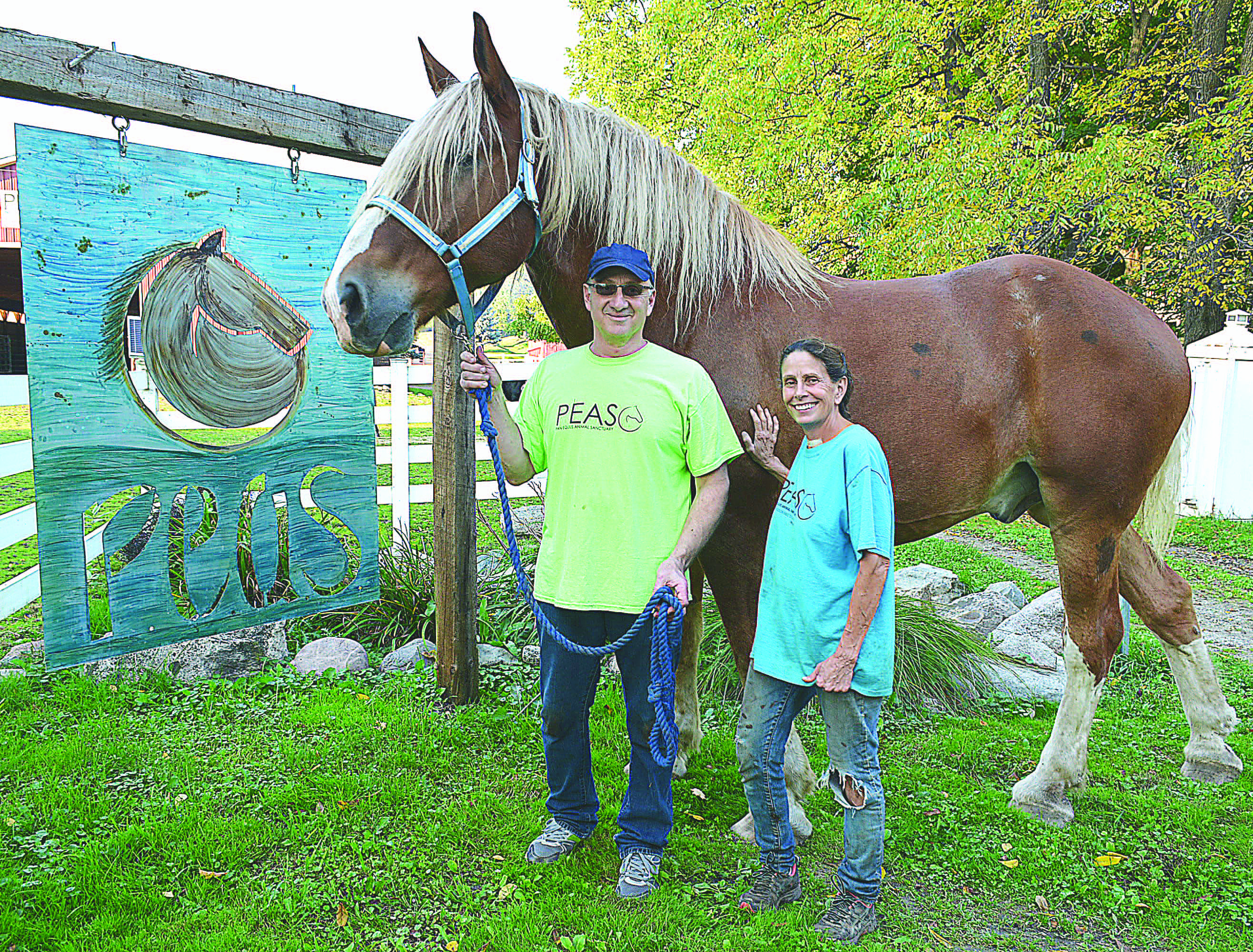
10-year-old Belgian draft horse. He’s one of 36 horses living at PEAS. Photo by C.J. Carnacchio.
To help ensure its animals don’t go hungry this winter, the Pan Equus Animal Sanctuary (PEAS) in Oxford Township is hosting its Second Annual Fall Fund-raiser on Sunday, Oct. 16 from noon to 4 p.m.
“It just a great way to spend a few hours and maybe do something that you don’t get to do the rest of the year,” said Ed Stull, who cofounded the nonprofit animal sanctuary with his wife, Judy Duncan, a veterinarian who practiced for 21 years before retiring.
The fund-raiser will include games, arts and crafts, face painting, opportunities to meet and pet the animals, a haunted hay ride, silent auction and raffle, bake sale, educational exhibits, food and beverages.
Admission is $5 per person and every five-spot buys one 60-pound bale of hay. Kids age 5 and under are free.
The goal is to raise enough to purchase 2,500 bales to feed the sanctuary’s 36 horses, seven goats and one donkey during the winter months.
Last year, the goal was to raise enough for 1,500 bales of hay, but the number of four-legged critters in the PEAS family has grown since then.
“We’ve picked up a lot of animals,” Stull said. “We’re clearly filling a need.”
Located on a 75-acre farm at 940 Hummer Lake Rd. between M-24 and N. Coats Rd., PEAS has been operating since 1994, but it didn’t become a public nonprofit organization until 2014.
The sanctuary’s primary focus is taking in horses who have been abused, neglected, suffer from health issues or are getting old.
“Everything we have has a story,” Stull said.
Stull made it clear that PEAS is not a dumping ground for healthy horses that are simply no longer wanted for one reason or another. “We don’t want people to look at horses as disposable,” he said.
PEAS is willing to work with people to help find homes for healthy, adoptable horses, but it can’t take them in because if the sanctuary didn’t strictly limit itself to rescue cases, Stull said, “It would be wall-to-wall horses out there.”
Horses at PEAS vary greatly in age. The youngest is a year-and-a-half while the oldest ones are in their early 40s. PEAS houses a variety of breeds and sizes, from miniatures to draft horses.
The biggest horse on the farm is Glenn, a 10-year-old Belgian draft horse. He’s 19 hands high (one hand equals 4 inches) and weighs an estimated 2,500 pounds. Glenn has a condition that affects the movement of his left hind leg.
“He’s just a magnificent animal,” Duncan said. “He’s very gentle. There’s not a mean bone in his body.”
In addition to horses, PEAS also has goats, chickens, dogs, cats and pigs.
“We make a lifelong commitment to these animals,” Stull said. “It’s a one-way ticket. They come to the farm and if everything goes right, they’ll die (here) of old age.”
Stull noted the one thing every animal on the farm has in common is if PEAS hadn’t taken it in, it would have been either put down or sent to slaughter. The couple does what it can to help those it can.
“I know you can’t save them all,” Duncan said.
“We all know what it’s like to need a helping hand some time. Animals feel that (way), too,” Stull said. “I just love being able to make a difference for them. I don’t want anything for myself. You just want to do as much as you can to help those that can’t help themselves.”
The main thing at PEAS is all the animals are given the freedom to just live and be who they are, according to Stull and Duncan.
They’re not expected to be ridden, pull a wagon or carriage, or perform for people. They can spend their days wandering the spacious pasture, simply grazing and playing.
“We try to keep things as natural as we can for most of them and give them back their dignity,” Duncan said.
PEAS encourages positive, one-on-one interactions between humans and animals via volunteer opportunities at the sanctuary.
“There’s a bond that develops between people and animals. We see that every day,” Stull said. “It’s wonderful if we can help foster that.”
PEAS welcomes and encourages visits from schools and scout groups.
“We try to make it educational and entertaining,” Stull said. “We don’t turn down any schools. That’s at the top of our list.”
To learn more, please visit PEAS online at www.peanimalsanctuary.org.

Do you ever have a day where people can come tour your place?